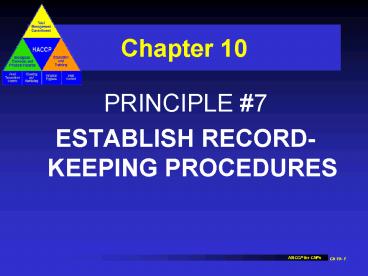PRINCIPLE - PowerPoint PPT Presentation
1 / 26
Title:
PRINCIPLE
Description:
Standardized recipes. Summary of hazard analysis. Food process flow diagrams ... Product: Ground Beef Chili. Ch 10- 18. HACCP for CNPs ... casserole from ... – PowerPoint PPT presentation
Number of Views:132
Avg rating:3.0/5.0
Title: PRINCIPLE
1
Chapter 10
- PRINCIPLE 7
- ESTABLISH RECORD-KEEPING PROCEDURES
2
Whats Your Knowledge?(T or F)
- Record-keeping must be accurate.
- Food safety problems can be identified through
good records. - Employee training is crucial for good
record-keeping. - Time and temperature logs are the only
documentable records used by a CNP.
3
Objectives
- Be able to
- State the importance of good record-keeping in a
HACCP system - Identify what records you should keep in a HACCP
system - Identify information that HACCP records should
contain - Identify key steps in implementing HACCP
4
Reasons For Records
- Document compliance with HACCP
- Show critical limits at each CCP were met or
corrective actions were taken - Help identify food safety problem areas
- Document that you are conscientiously preparing
and serving safe food
5
Two Requirements
- Records must be accurate
- Records must contain enough information to know
if HACCP is performed correctly - Easiest to implement if
- Simple
- Part of employees daily routine
6
HACCP Team Determines
- What records to keep
- Where to keep them
- Who will keep them
- What forms/logs will be used
- When forms/logs will be filled out
7
What Records ?
- HACCP plan
- Support documentation
- Records generated during
operation of the plan
8
Examples of HACCP Records
- List of HACCP team and assigned duties
- Description of food, distribution, intended use,
and customers - Standardized recipes
- Summary of hazard analysis
- Food process flow diagrams
- Steps that are CCPs
- Hazards of concern
9
Examples of HACCP Records
- Critical limits
- Monitoring procedures
- Corrective actions
- Verification procedures and schedule
- Record-keeping procedures
- Documentation of adequacy of HACCP plan
- Supplier certification records
10
Examples of HACCP Records
- Records indicating compliance with critical
limits - Calibration logs
- Monitoring logs
- Deviation and corrective action logs
- Verification records
- Employee training records
11
Where Are Records Kept ?
- Logs easily accessible to employees
- Time and temperature logs near appropriate
equipment - Old and completed logs retained and stored
12
Who Will Fill Out Records ?
- Designate an employee to complete the
records-monitoring - Part of employees regular duties
13
What Forms/Logs Are Used ?
- HACCP team determines logs and forms
- Team also decides on support documentation
14
When Are Forms/Logs Filled Out ?
- HACCP team specifies when to fill out forms/logs
- Calibration and temperature logs filled out on
daily basis - Some forms filled out weekly and monthly
15
Ex. 1 Record-Keeping Procedures
16
CCP Record-Keeping Procedures
17
Ex. 2 CCP Record-Keeping Procedures
18
HACCP Summary Table
- Organize various procedures set up for CCPs
- Organize forms by hazards, critical limits,
monitoring procedures, corrective actions,
verification procedures, and record-keeping
procedures - Keep together with summary table
19
Ex. 3 HACCP Plan Summary Table
20
Employee Training
- Employees
- Understand importance of maintaining accurate
records - Are provided with appropriate record-keeping
tools - Are trained in the proper procedures for filling
out the records/logs - Records of employee training are kept
21
Summary Developing and Implementing the HACCP
Plan
- Train HACCP coordinator/members of team
- Make HACCP team responsible for developing and
implementing HACCP plan - Appoint teams to develop plans for specific menus
- Train employees on appropriate monitoring
procedures - Develop forms and records to track and correct
problems
22
Summary Developing and Implementing the HACCP
Plan
- Develop a time line for HACCP implementation
- Continually apply monitoring, record-keeping,
corrective action procedures, etc. - Regularly schedule verification activities
- Update plan as needed
- Be sure employees understand role of HACCP and
their responsibilities
23
Activity
- Discussion Questions
- Review Questions
- Case Studies (FSD) (See next 3 slides)
- Activity Establish Record-Keeping (FSD) Tuna
Salad Sandwich - Activity Establish Record-Keeping (FSD) Beef
Taco Filling - Homework Establish Record-Keeping (FSD)
24
Case Study 1(FSD)
- Jefferson Junior High has a full-service kitchen.
It makes tuna casserole from scratch. Cooking is
a CCP with the critical limit Cook until it
reaches an internal temperature of 165oF or above
for 15 seconds. The record-keeping procedures
for this step are Write the temperature on the
temperature log. What is missing? How would you
improve the procedures?
25
Case Study 2 (FSD)
- The Jefferson Junior High HACCP team designed a
log for documenting time and temperatures at the
cooking CCP. How would you change this log so
that record-keeping will be more effective?
26
Case Study 3 (FSD)
- The Waterville School District HACCP team
established the following record-keeping
procedures for the overall HACCP system. How
would you improve these procedures?































